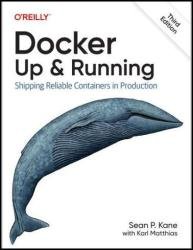Docker: Up & Running, 3rd Edition (Final)
- Добавил: literator
- Дата: 16-06-2024, 17:35
- Комментариев: 0
 Название: Docker: Up & Running: Shipping Reliable Containers in Production, 3rd Edition (Final)
Название: Docker: Up & Running: Shipping Reliable Containers in Production, 3rd Edition (Final)Автор: Sean P. Kane, Karl Matthias
Издательство: O’Reilly Media, Inc.
Год: 2023
Страниц: 419
Язык: английский
Формат: True PDF, True EPUB (Retail Copy)
Размер: 10.1 MB
Docker and Linux containers have fundamentally changed the way that organizations develop, deliver, and run software at scale. But understanding why these tools are important and how they can be successfully integrated into your organization's ecosystem can be challenging. This fully updated guide provides developers, operators, architects, and technical managers with a thorough understanding of the Docker tool set and how containers can improve almost every aspect of modern software delivery and management.
This edition includes significant updates to the examples and explanations that reflect the substantial changes that have occurred since Docker was first released almost a decade ago. Sean Kane and Karl Matthias have updated the text to reflect best practices and to provide additional coverage of new features like BuildKit, multi-architecture image support, rootless containers, and much more.
Docker is a tool that promises to easily encapsulate the process of creating a distributable artifact for any application, deploying it at scale into any environment, and streamlining the workflow and responsiveness of agile software organizations. Initially, many people who were unfamiliar with Docker viewed it as some sort of virtualization platform, but in reality, it was the first widely accessible tool to build on top of a much newer technology called containerization. Docker and Linux containers have had a significant impact on a wide range of industry segments that include tools and technologies like Vagrant, KVM, OpenStack, Mesos, Capistrano, Ansible, Chef, Puppet, and so on. There is something very telling about the list of products that Docker competes with, and maybe you’ve spotted it already. Looking over this list most engineers would recognize that these tools span a lot of different use-cases, yet all of these workflows have been forever changed by Docker. This is largely because Docker has significantly altered everyone’s expectations of how a CI/CD workflow should function.
If you were to do a feature-by-feature comparison of Docker and the reigning champion in any of these individual areas (e.g. configuration management), Docker would very likely look like a middling competitor. It’s stronger in some areas than others, but what Docker brings to the table is a feature set that crosses a broad range of workflow challenges. By combining the ease of application testing and deployment tools like Vagrant and Capistrano with the ease of administrating virtualization systems, and then providing interfaces that make workflow automation and orchestration easy to implement, Docker provides a very enabling feature set.
Initially, many people who were unfamiliar with Docker viewed it as some sort of virtualization platform, but in reality, it was the first widely accessible tool to build on top of a much newer technology called containerization. Docker and Linux containers have had a significant impact on a wide range of industry segments that include tools and technologies like Vagrant, KVM, OpenStack, Mesos, Capistrano, Ansible, Chef, Puppet, and so on. There is something very telling about the list of products that have had their market share directly impacted by Docker, and maybe you’ve spotted it already. Looking over this list most engineers would recognize that these tools span a lot of different use cases, yet all of these workflows have been forever changed by Docker. This is largely because Docker has significantly altered everyone’s expectations of how a CI/CD workflow should function. Instead of each step involving a time-consuming process managed by specialists, most people expect a DevOps pipeline to be fully automated and flow from one step to the next without any human intervention. The technologies in that list are also generally acclaimed for their ability to improve productivity, and that’s exactly what has given Docker so much buzz. Docker sits right in the middle of some of the most enabling technologies of the last decade and can bring significant improvements to almost every step of the pipeline.
Learn how Docker and Linux containers integrate with cloud services and Kubernetes
Experience building OCI images, plus deploying and managing Linux containers with powerful command-line tools
Understand how OCI images simplify dependency management and deployment workflow for your applications
Learn practical techniques for deploying and testing Linux containers in production
Deploy production containers at scale wherever you need them
Explore advanced Docker topics, including deployment tools, networking, orchestration, security, and configuration
Скачать Docker: Up & Running, 3rd Edition (Final)
Внимание
Уважаемый посетитель, Вы зашли на сайт как незарегистрированный пользователь.
Мы рекомендуем Вам зарегистрироваться либо войти на сайт под своим именем.
Уважаемый посетитель, Вы зашли на сайт как незарегистрированный пользователь.
Мы рекомендуем Вам зарегистрироваться либо войти на сайт под своим именем.
Информация
Посетители, находящиеся в группе Гости, не могут оставлять комментарии к данной публикации.
Посетители, находящиеся в группе Гости, не могут оставлять комментарии к данной публикации.
